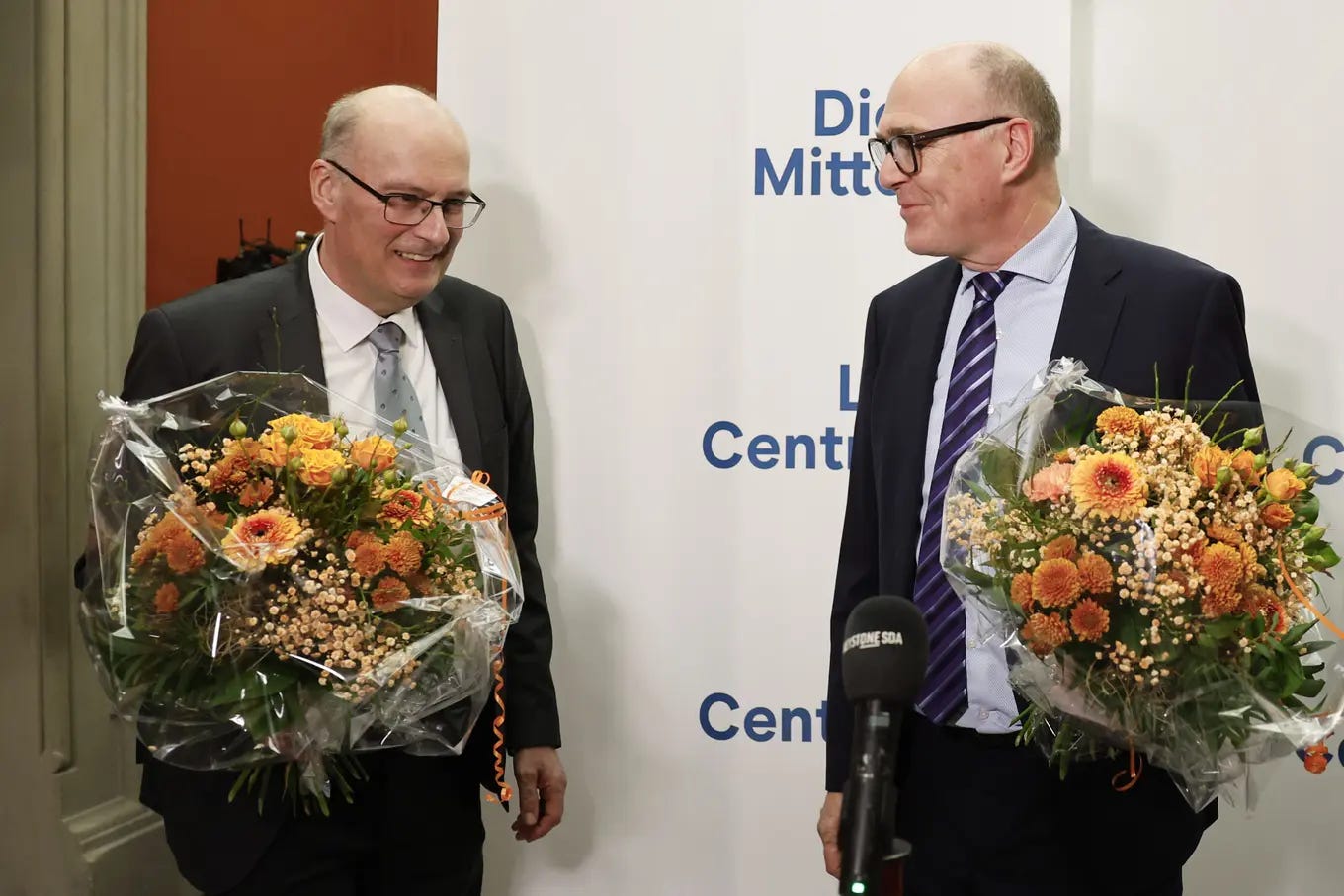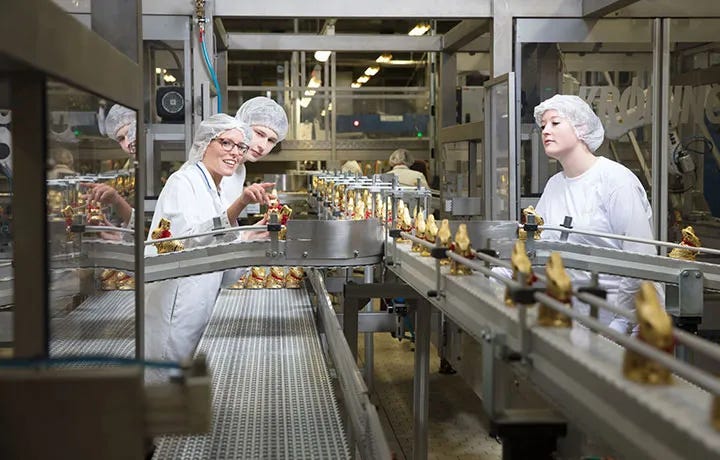Dear Insider,
What is the price of security?
Few - if anyone - can answer that question.
But it becomes especially relevant in today’s geopolitical context with Europe arming for war and the United States seemingly turning its back on the Old Continent.
It is also a question to be answered by the winner of Wednesday’s Federal Council election. The newly elected councillor - whoever it may be - will likely be charged with overseeing the Swiss armed forces.
And figuring out how to spend the billions needed to keep Switzerland safe.
Meanwhile, there is another set of prices in the news…
Enjoy this week’s edition,
Ian
💡PS: Please share what you like (or don’t) about The Swiss Insider. Reply to this email and let me know! 🙏🏻
💥Quick hits
Short (sweet) summaries of top stories…
🪙 Cold, hard cash
The Swiss parliament is considering a popular initiative titled "Yes to an Independent, Free Swiss Currency with Coins or Banknotes (Cash is Freedom)"
The initiative seeks to constitutionally guarantee the availability of cash and require a national referendum for any currency replacement.
Despite the rise of digital payments, cash remains valued in Switzerland…though not as much as it used to be.
A 2022 Swiss National Bank study indicating that 36% of payments were made using cash, down from 70% in 2017.
If approved, the initiative would constitutionally ensure cash availability and mandate public approval for any currency changes, though existing regulations already address these provisions.
👋🏻 Good-night and good-bye
It was a sad day on Bahnhofstrasse…
On February 28, 2025, Jelmoli, Zurich's historic department store, closed its doors after 125 years.
The closure evoked sadness among customers, many of whom shared fond memories and expressed regret over the loss of the iconic mainstay of high-end shopping in Zurich’s city center.
Peter Leumann, Jelmoli's CEO from 1996 to 2003, criticized the current owner, Swiss Prime Site (SPS), accusing them of prioritizing profit over the store's legacy. He argued that with proper management, Jelmoli could have remained viable.
In response, SPS cited changing consumer habits and the rise of online shopping as reasons for the store's declining profitability, leading to the decision to close.
💥The final showdown
It won’t exactly be “high noon” - but there is a showdown coming this week…
On March 12, 2025, the Swiss parliament will elect a new Federal Councillor to succeed Viola Amherd.
Here is how the matchup is currently stacking up….
Candidates
In line with the 'magic formula'—an informal agreement ensuring proportional representation of major parties in the Federal Council—the Centre Party is expected to retain its seat.
The party has nominated two candidates:
Markus Ritter: A National Councillor from St. Gallen and president of the Swiss Farmers' Association, Ritter has been a prominent figure in Swiss agriculture and politics.
Martin Pfister: Serving as health minister in the canton of Zug, Pfister brings extensive experience in cantonal governance.
Parliamentary Dynamics
The election has sparked a wide range of reactions across political factions. The election math is currently still very much in flux:
SVP (62 members): Ritter enjoys significant support within the right-wing SVP due to his conservative stance and leadership in agriculture. However, some members express reservations, with approximately ten seem to favor Pfister.
SP (41 members): The Social Democrats lean towards Pfister, viewing him as the preferable option. Nonetheless, Ritter's assertive approach to reforming the Federal Department of Defence, Civil Protection and Sport (VBS) appeals to certain SP members.
FDP (41 members): The Free Democratic Party's stance remains fluid. Their decision is anticipated to be pivotal in the final outcome.
Die Mitte (28 members): Both candidates hail from the Centre party, although Ritter comes from the more conservative wing, which has generally dominated the group.
Grüne (23 members) and GLP (10 members): The Green Party and the Green Liberal Party have not publicly disclosed their preferences, adding an element of unpredictability.
Candidates' Performance in Hearings
During parliamentary hearings with various political, both candidates presented their visions:
Markus Ritter: The self-styled “strong man” emphasized the need for decisive reforms within the VBS, advocating for a robust and efficient defense system.
Martin Pfister: Highlighted his administrative experience and commitment to collaborative governance.
Wild card
One deciding factor may be the topic of cantonal representation.
Ritter would make a second federal councillor from St. Gallen, alongside Karin Keller-Sutter. Meanwhile, central Switzerland - including Zug and Luzern - have not had a Federal Council representative in over 40 years.
The support from undecided factions, particularly the FDP, will be crucial in the final vote.
🤑 The PE firms that are ‘Swissing’ it
Who controls this company…or that one? Who is running the show?
Often - in Switzerland, but not only - it’s a private equity firm. Some are famous…others not so much.
This lesser-known PE firms are doing quite well…
Is Lindt milking the market?
Lindt is being honest…maybe too much so?
The Swiss chocolate manufacturer has announced double-digit percentage price increases in 2025 due to soaring cocoa costs.
The price per ton of cocoa has surged to approximately CHF 9,000, four times the long-term average.
In 2024, Lindt raised prices by 6.3%, but this was not enough to offset the steep rise in cocoa bean costs.
And yet…the numbers for Lindt look good.
The company reported a 7.8% organic sales growth in 2024, with total sales reaching CHF 5.47 billion.
And despite the challenging market conditions, Lindt projects continued growth.
Forecasts for organic sales growth stand at between 7% and 9% for 2025, alongside an improvement in operating profit margins by 20-40 bps.
The bigger picture
In the wider context - making Lindt more expensive makes sense.
The broader chocolate industry is also experiencing price hikes.
For instance, Milka chocolate bars have seen price increases from €1.49 to €1.99 in major retail chains.
Given the current cocoa price trajectory, Lindt anticipates that if prices do not decrease significantly in the latter half of 2025, further adjustments may be necessary in 2026.
Prepared for tariffs
Like a good Swiss company, Lindt is getting ready for anything.
The company has been adjusting its supply chain in response to the recent U.S. imposition of a 25% tariff on imports from Canada and Canada’s equivalent tariffs on U.S. goods…one of which is chocolate.
To circumvent these tariffs, Lindt plans to supply the Canadian market exclusively from its European production facilities, shifting from its previous strategy of sourcing 50% of its Canadian supply from the U.S.
This move aims to maintain competitive pricing and mitigate the impact of tariffs on Canadian consumers.
However, this adjustment may result in slightly higher transportation costs.
Who should read The Swiss Insider?
Why not take a minute to share this edition of The Swiss Insider - with your network, your colleagues…or with someone who will appreciate it?
A Chart is Worth…
How much is cash REALLY used in Switzerland? Is it even necessary? Or just for money-laundering…? Here are the statistics:
The Bonus
🔁 No free lunch, Donald - The Swiss Socialist Party (SP) has come out against the possibility of a free-trade agreement between the US and Switzerland, arguing that a deal with Donald Trump’s America would undermine local farmers and water down Swiss agricultural standards. (Link)
🏦 Top that, Europe - In 2024, the Swiss National Bank (SNB) reported a record profit of CHF 80.7 billion, primarily due to gains from foreign currency positions and gold holdings. Meanwhile, the European Central Bank (ECB) dropped a loss of €7.9 billion. (Link)
⏱ Untimely unemployment - The Swiss watch industry, particularly in the Jura region (where 5% unemployment is Switzerland’s highest), is enduring a hard downturn marked by reduced demand from China. (Link)










